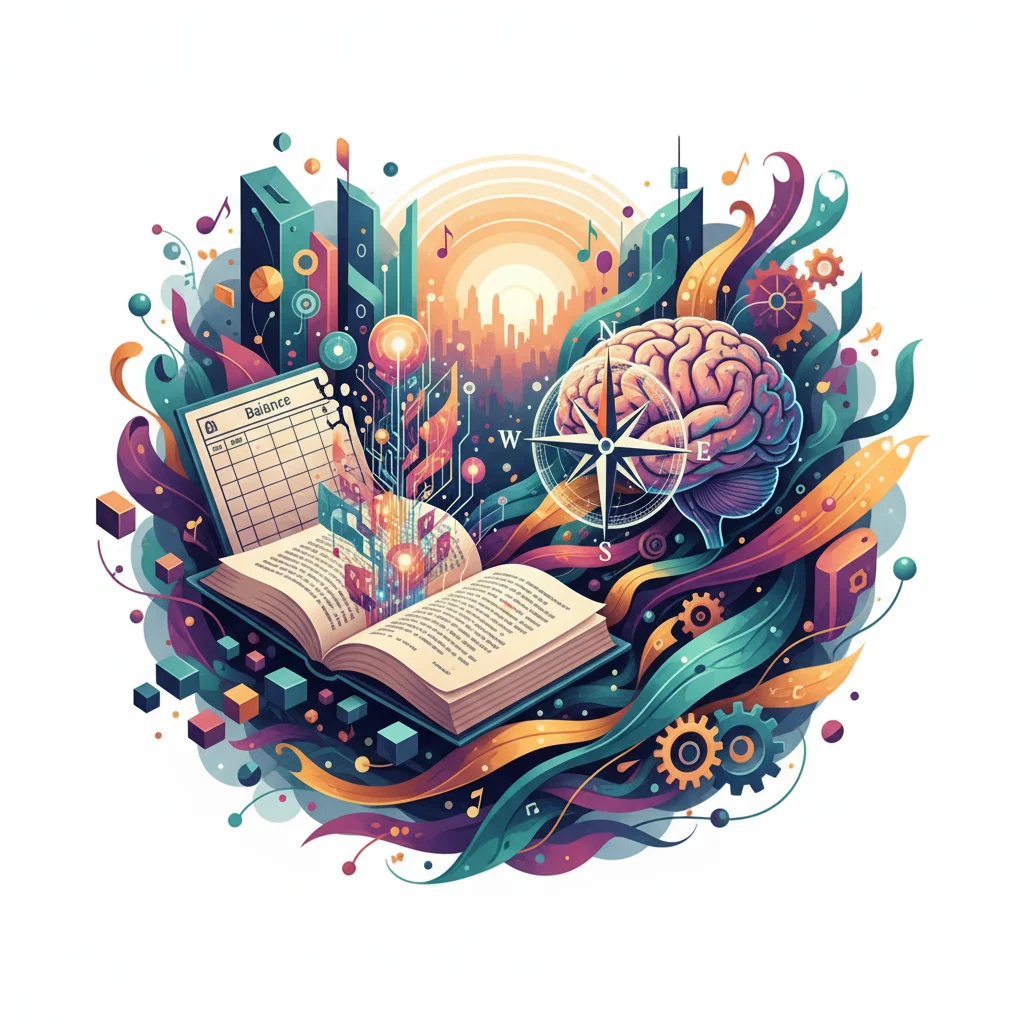
Beyond the Balance Sheet: Why the Most Powerful Tool in Finance Might Be a Novel
When the musician Grimes described her former partner, Elon Musk, as “uncultured,” it sparked a familiar, if tired, debate. The comment played into a pervasive stereotype: the tech and business titan who is a genius with code and capital but a philistine when it comes to the arts and humanities. This idea paints a picture of a leader who can build a rocket but can’t appreciate a sonnet, a figure who understands the intricacies of the stock market but not the nuances of the human heart.
This portrayal, however, feeds a dangerous and fundamentally false dichotomy—a belief that the worlds of business, finance, and technology are somehow separate from, or even superior to, the world of literature and culture. In an era dominated by quantitative analysis, algorithmic trading, and the relentless pursuit of data-driven efficiency, we are increasingly led to believe that the “soft” skills cultivated by the humanities are a luxury. They are not. In fact, for anyone navigating the complexities of the modern economy, from banking executives to fintech innovators, they are a necessity. The ability to read deeply, to grapple with ambiguity, and to understand the vast spectrum of human motivation is not a distraction from the real work of generating alpha; it is the very foundation of sustainable success.
The “Two Cultures” Fallacy in the Modern Boardroom
Over sixty years ago, British scientist and novelist C.P. Snow delivered a famous lecture titled “The Two Cultures.” He lamented the growing chasm between scientists and literary intellectuals, arguing that this intellectual divide was a major hindrance to solving the world’s problems. Today, Snow’s “two cultures” are alive and well, not just in academia, but in the C-suite. We see it in the reverence for STEM degrees over liberal arts, the prioritization of coding bootcamps over philosophy seminars, and the belief that a leader’s time is better spent on a spreadsheet than in a Shakespearean play.
This mindset is particularly prevalent in the world of finance. The industry has undergone a radical transformation, driven by financial technology that prizes computational power and speed. High-frequency trading algorithms execute millions of orders in seconds. Blockchain technology promises to rewire the entire banking infrastructure. Investors pour over terabytes of data, searching for a statistical edge. In this environment, it’s easy to see why the concrete, measurable world of numbers feels more valuable than the abstract, interpretive world of words.
But this view is dangerously myopic. The economy is not a machine; it is a complex, adaptive system driven by human beings. The stock market is not just a collection of tickers and charts; it is a vast theatre of human emotion, swinging between greed and fear. A corporate merger is not merely a financial transaction; it is a delicate negotiation of egos, cultures, and competing narratives. To ignore the human element is to ignore the primary variable in the equation.
The Untapped ROI of a Literary Mind
While an MBA can teach you how to read a balance sheet, a great novel can teach you how to read a room, a market, or a rival. The skills honed by engaging with literature are not “soft” at all; they are the critical, high-impact skills that separate competent managers from visionary leaders.
1. Mastering Empathy and Market Psychology
Great literature is a masterclass in empathy. By immersing ourselves in the lives of fictional characters—their hopes, fears, flaws, and triumphs—we train our minds to see the world from multiple perspectives. This is not a trivial exercise. For an investor, it’s the ability to understand why the market is panicking when the data says it shouldn’t. For a fintech entrepreneur, it’s the ability to grasp the unspoken needs and frustrations of a customer. For a CEO, it’s the capacity to anticipate the concerns of employees during a period of intense change. Understanding character is understanding motivation, and understanding motivation is the key to predicting behavior—in markets and in management.
2. Navigating Radical Ambiguity
The world of finance and investing is defined by uncertainty. Black swan events, geopolitical shocks, and sudden shifts in consumer sentiment can render the most sophisticated economic models useless. Business leaders are constantly forced to make high-stakes decisions with incomplete information. Literature is perhaps the best training ground for this reality. A complex novel by Dostoevsky or Faulkner doesn’t offer easy answers. It forces the reader to hold contradictory ideas, interpret subtle cues, and navigate moral gray areas. This cognitive exercise builds mental resilience and a comfort with ambiguity that is indispensable when leading a company through a volatile market or a paradigm-shifting technological disruption like blockchain.
3. The Power of Strategic Storytelling
Facts and figures can inform, but stories persuade. A leader’s most critical job is to craft and communicate a compelling narrative—a story about the company’s mission, its future, and its place in the world. This story is what attracts top talent, secures investment, and builds lasting customer loyalty. Who better to learn from than the master storytellers of history? Reading great writers is a direct education in structure, pacing, metaphor, and emotional resonance. The ability to frame a quarterly earnings report not just as a set of numbers, but as a chapter in a larger, compelling story is a powerful leadership tool.
The Leader’s Bookshelf: A Portfolio of Perspectives
The argument is not to abandon business books, but to diversify one’s intellectual portfolio. While a book on negotiation tactics offers practical tools, a biography of a historical figure provides a richer, more contextual lesson in strategy and human nature. Below is a look at how different genres can equip a leader with essential skills for navigating the modern economy.
| Genre | Key Skill Developed | Relevance to Finance & Business |
|---|---|---|
| Classic Fiction (e.g., Tolstoy, Austen) | Deep empathy, understanding of social dynamics, and human motivation. | Improves stakeholder management, team leadership, and understanding consumer psychology beyond simple demographics. |
| History & Biography (e.g., Chernow, McCullough) | Pattern recognition, understanding of long-term cycles, and learning from past mistakes. | Provides context for economic cycles, banking crises, and the recurring patterns of human behavior in financial markets. |
| Science Fiction (e.g., Asimov, Stephenson) | Creative problem-solving, envisioning future possibilities, and grappling with the ethical implications of technology. | Essential for leaders in fintech, blockchain, and AI, helping them think beyond the current quarter and anticipate future trends. |
| Philosophy & Ethics (e.g., Aurelius, Kant) | Critical thinking, logical reasoning, and building a strong ethical framework. | Crucial for navigating complex regulatory environments and making sound, principled decisions under pressure. |
Leaders like Warren Buffett, who famously spends most of his day reading, and Satya Nadella, who credits poetry with shaping his empathetic leadership style at Microsoft, are not outliers. They are exemplars of a more holistic, and ultimately more effective, model of leadership. They understand that the insights needed to navigate the future of the economy are often found in the wisdom of the past.
The Widening Gulf: Why the Fed Sees Wealth Inequality as the Next Big Threat to the US Economy
How to Build a C-Suite Reading Culture
For the busy professional, the idea of adding “read War and Peace” to the to-do list can seem daunting. But integrating deep reading into a professional life is not about finding massive blocks of empty time; it’s about a shift in mindset—viewing reading not as leisure, but as a core professional development activity.
- Start with Curiosity: Don’t force yourself to read a classic because you feel you “should.” Start with a topic that genuinely fascinates you, whether it’s the history of banking, the space race, or a thriller novel. The habit is more important than the specific book.
- Schedule It: Treat reading like a meeting. Block out 30 minutes on your calendar each day. The consistency will yield surprisingly powerful results over time.
- Diversify Your Inputs: Create an intellectual diet that includes a mix of fiction, non-fiction, industry journals, and poetry. Each format exercises a different part of your brain and provides a unique lens on the world.
- Lead by Example: For business leaders, fostering a reading culture can be a powerful competitive advantage. Start a company book club (that reads more than just business books), share what you’re reading with your team, and ask colleagues for their recommendations. This signals that intellectual curiosity is a valued trait within the organization.
Decoding the Fed's Next Move: John Williams on Inflation, Rate Cuts, and the Future of the Economy
Conclusion: The Ultimate Competitive Edge
The false wall between the “cultured” and the “corporate” must come down. The challenges we face in the 21st-century economy—from navigating the ethical minefields of new financial technology to leading diverse global teams through unprecedented volatility—demand more than just technical expertise. They demand wisdom, perspective, empathy, and a profound understanding of the human element that underpins every market, every transaction, and every organization.
These are the skills that literature and the humanities have been cultivating for centuries. Reading is not an escape from the real world; it is the most potent tool we have for understanding it. So the next time you’re searching for an edge, don’t just look at the data. The most valuable alpha might be waiting for you on your bookshelf.


